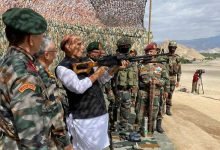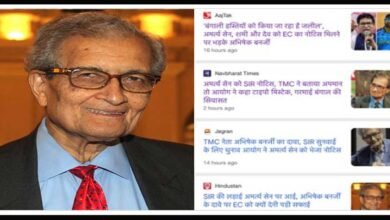“Operation Sindoor: India Strikes Back, Destroys 9 Terror Camps in Pakistan and PoK”
The operation targeted nine terrorist camps across Pakistan and Pakistan-occupied Jammu and Kashmir (PoK), delivering a strong message against cross-border terrorism.

OPERATION SINDOOR- In a bold and calculated response to the April 22, 2025, terror attack in Pahalgam, Jammu and Kashmir, which claimed 26 lives, including 25 Indians and one Nepali citizen, the Indian Armed Forces executed ‘Operation Sindoor’ in the early hours of Wednesday.
The operation targeted nine terrorist camps across Pakistan and Pakistan-occupied Jammu and Kashmir (PoK), delivering a strong message against cross-border terrorism.
The tri-services offensive, involving the Indian Army, Navy, and Air Force, was launched at approximately 1:44 AM IST, utilizing precision strike weapons, to destroy key terrorist infrastructure.
Also Read- Assam to Conduct Statewide Mock Drill in 14 Civil Defence Districts Amid Rising Security Concerns
The targets included the Jaish-e-Mohammed (JeM) headquarters in Bahawalpur, the Lashkar-e-Taiba (LeT) base in Muridke, and other facilities linked to Hizbul Mujahideen in locations such as Kotli and Muzaffarabad.
The operation was described by the Indian Ministry of Defence as “focused, measured, and non-escalatory,” explicitly avoiding Pakistani military facilities to minimize the risk of broader conflict.
According to sources, the strikes resulted in the deaths of over 70 terrorists, with some estimates suggesting up to 90 casualties, including key operatives trained at the targeted camps.
Also Read- Joint Security Operations in Manipur Yield Major Successes: 17 Cadres Apprehended, Arms Recovered
The Indian government stated that the operation was a direct response to intelligence linking the Pahalgam attack to Pakistan-based terror groups, underscoring India’s resolve to hold perpetrators accountable.
Prime Minister Narendra Modi closely monitored the operation throughout the night, while Defence Minister Rajnath Singh hailed the strikes, posting on X, “Bharat Mata ki Jai” (Glory to Mother India).
Foreign Secretary Vikram Misri confirmed that investigations into the Pahalgam attack revealed a clear Pakistan link, justifying the retaliatory action.
Also Read- Assam University Rocked by Sexual Harassment Allegations Against Assistant Professor
Home Minister Amit Shah praised the armed forces, stating, “#OperationSindoor is Bharat’s response to the brutal killing of our innocent brothers in Pahalgam.”
The operation’s name, ‘Sindoor’—referencing the red vermilion worn by married Hindu women as a symbol of love and devotion—resonated deeply with victims’ families. Arathy, daughter of N. Ramachandran, who was killed in the Pahalgam attack, expressed emotional support, saying, “There won’t be any other suitable title for the strikes other than ‘Operation Sindoor’.” Similarly, Rajesh Narwal, father of slain Lieutenant Vinay Narwal, called the operation “aptly named” and a step toward justice.
Also Read- Manipur Grinds to a Halt as Shutdown Marks Second Anniversary of Ethnic Conflict
In Jammu and Kashmir, locals raised slogans of “Indian Army Zindabad” and “Bharat Mata ki Jai,” reflecting widespread public approval. Congress leader Sandeep Dikshit described the strikes as “good news,” while BJP leader Altaf Thakur noted that the operation fulfilled public demand to end terrorism.
Pakistan’s Response and Escalation
Pakistan condemned the strikes as an “act of war,” reporting 26 deaths, including civilians, and 46 injuries. Pakistan’s Defence Minister vowed retaliation “at a time and place of its choosing,” escalating tensions between the nuclear-armed neighbors.
In response to the strikes, Pakistan resorted to heavy mortar shelling and artillery fire along the Line of Control (LoC) in Poonch and Rajouri districts, killing three civilians in indiscriminate firing, according to the Indian Army.
The Indian forces responded proportionately, while commercial flights were suspended in northern India, and key airports were shut for 48 hours as a precautionary measure. Schools in Punjab and Islamabad were closed, and Indian airspace remained under close surveillance amid fears of retaliation.
International Reactions
The operation drew mixed responses globally. Israel expressed support for India’s “right to self-defense,” while the United States, through a State Department spokesperson, said it was monitoring developments but offered no assessment.
The international community, including the United Nations, is closely monitoring the situation, urging both nations to step back from further military escalation.
China on Wednesday called for restraint from both India and Pakistan, expressing concern over the escalating tensions following Indian forces’ “Operation Sindoor” against terror camps across the border on early Wednesday morning.
Strategic Significance
Analysts described ‘Operation Sindoor’ as a significant escalation compared to previous Indian operations, such as the 2019 Balakot airstrike, due to the number of targets and the involvement of all three armed forces—the first such joint operation since 1971. The strike on Muridke, known as the “terror nursery” of Punjab, underscored India’s intent to dismantle LeT’s operational base, while the Bahawalpur strike targeted JeM’s training facilities linked to the 2019 Pulwama attack.
The operation has heightened fears of further escalation, with both nations conducting civil defense drills and Pakistan test-firing missiles in recent weeks.
Looking Ahead
As India and Pakistan exchange fire across the LoC, the international community remains on edge, wary of the potential for a broader conflict between the two nuclear powers. India’s government has emphasized its commitment to eradicating terrorism while avoiding unnecessary provocation, but Pakistan’s vow of retaliation suggests that the region may face continued volatility in the coming days.
Security has been tightened across India, with additional police and paramilitary forces deployed in the national capital and other key locations. The Indian Armed Forces remain on high alert, prepared to respond to any further provocations, as the nation stands united in its fight against terrorism.









